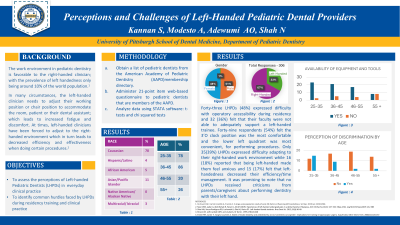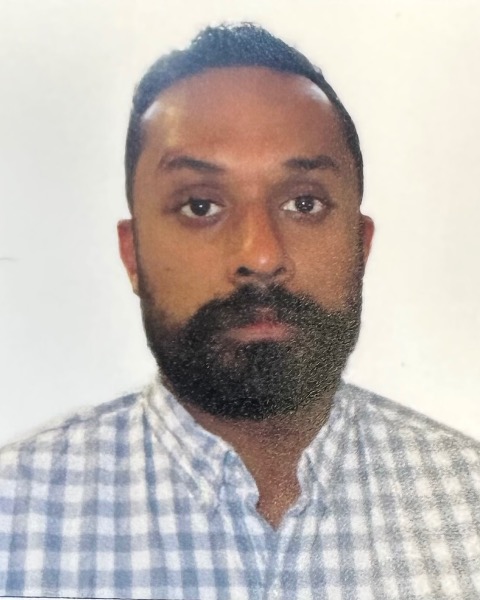Practice Management
493 - Perceptions Of Left-Handed Pediatric Dentists In The U.S


Sidharth Kannan, BDS, DMD
Resident
University of Pittsburgh, Pittsburgh, PA
University of Pittsburgh School of Dental Medicine
Pittsburgh, Pennsylvania, United States- DA
Dr. Abimbola Adewumi, BDS, FDSRCS(Eng), MClin Dent, MPed Dent RCS(Eng)
University of Pittsburgh School of Dental Medicine
- AM
Adriana Modesto Gomes Da Silva, DDS,DMD,Ph.D
Professor
University of Pittsburgh School Of Dental Medicine
University of Pittsburgh School of Dental Medicine
Pittsburgh, Pennsylvania, United States - AA
Abimbola Adewumi, BDS, FDSRCS (Eng), MClin Dent, MPed Dent RCS(Eng)
Chair
University of Pittsburgh School of Dental Medicine
Pittsburgh, Pennsylvania, United States
Presenting Author(s)
Co-Author(s)
Research Mentor(s)
Program Director(s)
Purpose: This study explored the experiences of the left-handed pediatric dentists (LHPDs) in residency and in clinical practice. The study examined challenges faced by LHPDs and identified strategies to make practicing clinical pediatric dentistry a more satisfying experience.
Methods: Participants were pediatric dentists recruited from the AAPD membership directory. A web-based questionnaire asked about demographic information, hand dominance, residency training and practice experience, operatory difficulties, and perceptions of caregivers.
Results: Of the 304 responses received, 100 respondents (33%) identified as LHPDs, and 90 participants completed the survey. Majority (51%) were male and 76(25%) were between the ages of 25-34 years. Forty-three LHPDs (48%) expressed difficulty with operatory accessibility during residency and 32 (36%) felt that their faculty were not able to adequately support a left-handed trainee. Forty-nine respondents (54%) felt the 3’O clock position was the most comfortable and the lower left quadrant was most convenient, for performing procedures. Thirty-four LHPDs (37%) claimed that dental assistants found more it more difficult to work with them compared to their right-handed peer. Fifty-five LHPDs (61%) expressed ease in adapting to their right-handed work environment; 16 (18%) reported that being left-handed made them feel anxious and 15 (17%) felt that left-handedness decreased their efficiency/time management. None of the participants reported receiving complaints from parents or caregivers about performing dentistry with their left hand.
Conclusion: Despite challenges faced by some left-handed pediatric dentists during residency, their adaptability has enabled them to practice successfully in a predominantly right-handed world.
Identify Supporting Agency and Grant Number:
Research supported by the University of Pittsburgh School of Dental Medicine Department of Pediatric Dentistry

.jpg)